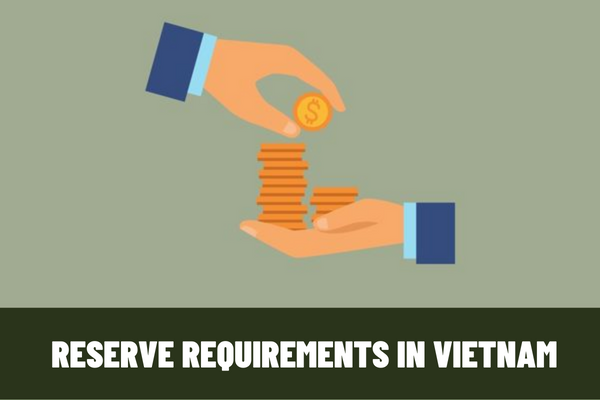What are reserve requirements in Vietnam? Which credit institutions are not bound by reserve requirements as prescribed by law?
What are reserve requirements in Vietnam?
According to the provisions of Clause 1, Article 14 of the 2010 Law on the State Bank of Vietnam, the definition of reserve requirements is as follows:
Reserve requirements
1. Reserve requirements means a sum of money to be deposited by a credit institution at the State Bank to serve the implementation of the national monetary policy.
2. The State Bank shall provide for the reserve requirement ratio applicable to each type of credit institution and each kind of deposit at credit institutions to serve the implementation of the national monetary policy.
3. The State Bank shall provide for the payment of interests on reserve requirement deposits and deposits in excess of reserve requirements applicable to each type of credit institution and each kind of deposit.
Thus, the reserve requirements means a sum of money to be deposited by a credit institution at the State Bank to serve the implementation of the national monetary policy.

What are reserve requirements in Vietnam? Which credit institutions are not bound by reserve requirements as prescribed by law?
What is the reserve requirement ratio for credit institutions nowadays?
Pursuant to Article 1 of Decision 1158/QD-NHNN in 2018, the reserve requirement ratio applicable to credit institutions and foreign bank branches is as follows:
- People's credit funds, microfinance institutions: The reserve requirement ratio for deposits in Vietnam dong and deposits in foreign currencies is 0%.
- Policy bank: The reserve requirement ratio according to the Government's regulations.
People's credit funds, microfinance institutions, policy banks, in case of being applied the reserve requirement ratio of 0% for all types of deposits, are not required to report to the State Bank on the average deposit balance subject to reserve requirements according to regulations on reserve requirement for credit institutions.
- The Bank for Agriculture and Rural Development of Vietnam and the Cooperative Bank shall apply the reserve requirement ratio corresponding to each type of deposit as follows:
+ Deposits in Vietnam dong with a term and with a term of less than 12 months are 3% of the total balance of deposits subject to reserve requirements calculation;
+ Deposits in Vietnam dong with a term of 12 months or more are 1% of the total balance of deposits subject to reserve requirements calculation;
+ Deposits in foreign currencies of overseas credit institutions are 1% of the total balance of deposits subject to reserve requirements calculation;
+ Deposits in foreign currencies subject to the reserve requirements requirement other than demand and with a term of less than 12 months are 7% of the total balance of deposits subject to the reserve requirements calculation;
+ Deposits in foreign currencies are subject to reserve requirements calculation other than the term of 12 months or more, which is 5% of the total balance of deposits subject to reserve requirements calculation.
- Other credit institutions (besides the above credit institutions) shall apply the reserve requirement ratio corresponding to each type of deposit as follows:
+ Deposits in Vietnam dong with a term and with a term of less than 12 months are 3% of the total balance of deposits subject to reserve requirements calculation;
+ Deposits in Vietnam dong with a term of 12 months or more are 1% of the total balance of deposits subject to reserve requirements calculation;
+ Deposits in foreign currencies of overseas credit institutions are 1% of the total balance of deposits subject to reserve requirements calculation;
+ Deposits in foreign currencies subject to the reserve requirements requirement other than demand and with a term of less than 12 months are 8% of the total balance of deposits subject to the reserve requirements calculation;
+ Deposits in foreign currencies subject to reserve requirements calculation other than the term of 12 months or more are 6% of the total balance of deposits subject to reserve requirements calculation.
Which credit institutions are not bound by reserve requirements as prescribed by law?
Pursuant to Article 3 of Circular 30/2019/TT-NHNN stipulating credit institutions not bound by reserve requirements as follows:
(1) Credit institutions placed under special control:
A credit institution is not required to maintain the reserve requirement for the period commencing from the month following the month when it is placed under the special control according to the decision made by the State Bank of Vietnam (hereinafter referred to as “SBV”) to the end of the month when the special control is lifted by SBV.
(2) Credit institutions that have not yet started their business:
The credit institution is not required to maintain the reserve requirement until the end of the month in which it is inaugurated. In this case, the credit institution shall notify SBV (Operations Center) in writing of its date of inauguration within 3 working days from that inauguration date.
(3) Credit institutions that are given an approval for dissolution or issued with a decision to institute bankruptcy proceedings or decision on revocation of business license by a competent authority:
The credit institution is not required to maintain the reserve requirement from the month following the month when it obtains the approval for dissolution or when the decision to institute bankruptcy proceedings or the decision on revocation of business license comes into force. In this case, the credit institution shall send the decision to institute bankruptcy proceedings to SBV (Operations Center) within 3 working days from the day on which it receives this decision.
LawNet